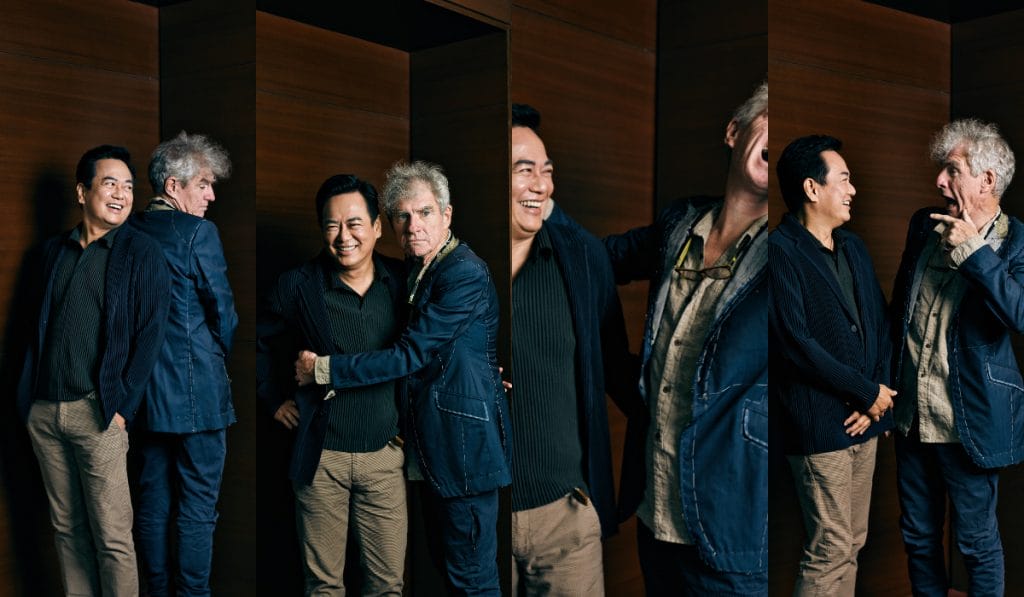Saw Teong Hin is visibly nervous. A video crew is setting equipment up in the hotel room where the film director is conducting his interview with The Peak and, while film crews are nothing new to Saw, today is a little different – his new movie, You Mean The World To Me, is about to premiere in a few hours and this interview comes just before a large press conference. “I’m much better behind the camera,†he says by way of apology.
We ditch some prepared questions and, as he answers off the cuff, Saw relaxes and opens up to the point where, in some instances, he is almost overcome with emotion. The movie, after all, cuts close to home for Saw, who explores the dynamics between him and his family, especially with his mother.
You Mean The World To Me has established precedents for Malaysian cinema. Set in Penang, it is the first Malaysian movie to be shot entirely in the Hokkien dialect to reflect Penang Chinese culture and community. It is also the first to feature cinematography by the award-winning Christopher Doyle, who is also on hand to officiate the film.

Rambunctious and uninhibited, Doyle serves as the perfect foil to Saw’s private, quiet nature, shooting off answers impetuously, some in jest, some quite serious. His tempestuous nature belies the focus and eye that have lent a signature sumptuous colour palate and languorous, camera style to most of Wong Kar Wai’s films, influencing the way mainstream movies now shoot. A hint of his character can be detected in the frenetic camera work of Wong Kar Wai’s Chungking Express. The list of accolades he has gained as a result of his pioneering work is endless – Cannes being the zenith.
The two play off each other’s energies, even exchanging personas towards the end of the shoot.

What is your earliest memory of the movies?
SAW TEONG HIN: I used to go to the movies every Sunday with my father and we used to go to the matinée. Sometimes, we would watch a matinée followed by a mid-day show. And when we had the money, sometimes I’d even get ice cream! With my father, we usually watched Chinese Wuxia films and the like. My mother also loved the movies. While trips to the cinema with her were not as regular as with my father, she would take me to Mandarin love stories, and Hindi and English movies. Going to the movies was a real treat and always something to look forward to.
CHRISTOPHER DOYLE: By the beach in Sydney. The movie house was more a refuge from the mid-day sun than a place to watch a film. It was a cool place to take a girlfriend to. We were too busy making out to care about what was on the screen.
How did you come to love film – who or what inspired you?
STH: There’s a story from my childhood and my sister tells me I would get so engaged watching television that my head would be following the movements of the heroes when they fought or I’d cry along. I guess my love for films developed from the films of my childhood but, more significantly, from being with my parents on those trips.
CD: I don’t love film. I love books. But I make films – I think it’s an aspect of life that suits you and, somehow, I happen to make films and I like to move, carry the camera… I like the intimacy of film. I’m always the closest to the actor. I like the challenge that you have to think on your feet. It’s not a career; it’s a way of living. What inspires me? Beer. Women. The sea. Colours. I think space, especially, is very much a character. As a filmmaker, hopefully we give you the space – most films try and show you what’s happening. I think the films I prefer to make, hopefully, suggest something outside the frame, something more that gives you the space to make it your own.
What do you love about the Penang Hokkien culture and language, and why did you want to highlight this in particular?
STH: Penang is the provenance and the language provides the context.
CD: Penang is such an astonishing space, especially the structure of the houses and the layout of the city. I’d been there a few times before. To me, to make a film is to really get to the heart of the place – even in Hong Kong, I walk every day and I don’t really look. But when you make a film, you focus your energy and, hopefully, we share what is special to that place.
Who are your favourite filmmakers and why?
STH: The list is long and varied. Must say, though, it is more the films than the filmmakers themselves who inspire me and the list is ever-changing.
CD: Teong Hin, of course. And all the other film-makers who make films like You Mean The World To Me – films that come from the heart. Filmmakers who care are the only ones that matter to me.
Click here to watch what happened when we put these masters of film-making in front of the lens for a change.
This article first appeared in the June 2017 issue of The Peak Malaysia. Subscribe today.



